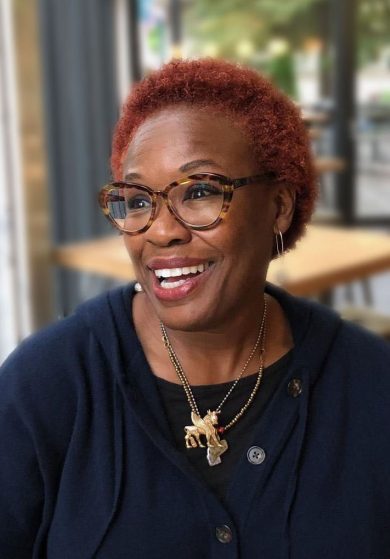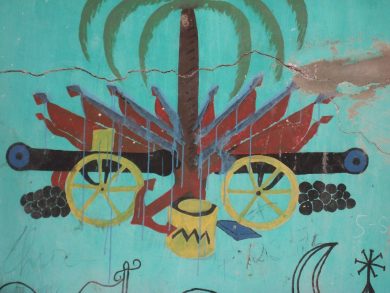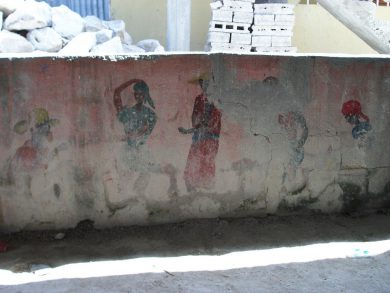Memory Series: Gina Athena Ulysse

Gina Athena Ulysse is an artist-anthropologist and Professor of Feminist Studies. Prior to coming to UC Santa Cruz last year, she was a Professor of Anthropology and African-American Studies at Wesleyan University. Ulysse’s work and artistic practice is rooted in what she calls Caribbean Rasanblaj – a gathering of ideas, people, things, and spirits. Her contribution to our Memory Series, “The Forgotten Repozwa,” is an excerpt from an unpublished memoir, Loving Haiti: Anatomy of Four Little o’s. She describes the piece as exploring a “moment during a Vodou ceremony in Haiti when the memories of mortals (across generations) and spirits collided.” Ulysse’s writing reminds us that the contestation of memory, and how it takes shape within frameworks of practice or tradition, sits at the very heart of community.
The Forgotten Repozwa
Repozwa (n). sanctuary, sacred place, resting place, from French reposoir (nom masculine) altar.
Woooooooyyyyyyy Wooooooyyyyyyyyyyy Woooooooyyyyyyyyyyyy
The sound began as a distant wail that grew grittier and grittier as it came closer. A halting screech deep inside the heads of those far and close that bounced wherever it found space. I could feel swirling within the walls of my skull… landed and stayed behind the base of my ears. The repeated woyyyys picked up their momentum and began to give me chere de poule (goose bumps). My heart was beating fast. It beat faster. Really fast.

What is happening? What is going on? Woyy. Wooyyy. Woooyyyys. With each wail, the o was being dragged out slowly to meet up with a collection of y‘s. Yet, all I hear is an arresting sound that threatened to make me want to simultaneously run… hide… scream… pick up a sword… jump…. It is guttural… face the devil… smile… it is all bliss… I can do anything… I will rule…No one can stop me… without any explanations whatsoever.
A skinny young man in a faded short-sleeved shirt and long pants stumbled down the ravine toward the crowd that had gathered at the sous (water source). But he is practically a kid, someone pointed out. Conversations between small clusters of attendants confirmed that he was being visited by Gran (a great-grandmother lwa—spirit). Is that really Gran? This recognition made its way quickly through the dispersed crowd. The countless phases of rituals of the ceremony had already started. Everything had gone according to plan until we began the salutation. We went to the first of many repozwas on the property.
Then all of a sudden someone exclaimed we were not doing things right. We had started wrong. This is not the way things were done in the past. When they were young, this was not the starting point.
Then all of a sudden someone exclaimed we were not doing things right. We had started wrong. This is not the way things were done in the past. When they were young, this was not the starting point. Murmurs evolved into whispers that became enunciated interruptions. Some voices hushed others. Louder ones objected. No! This is not the way that things are done. Femen bouch ou pitit. Se plas ou. Child, shut your mouth, it is not your place. Someone else, someone older stupes. What do you mean it’s not my place? Se swa nou fe afe nou byen ou byen no pa fel di tou. We either do things right or we do not do it at all. Several people gathered and talked it out and redirected us. We had begun the salutation at the wrong place.
Then a final sound escaped young Gran as they hurled their body into the cascading water with a humongous watery splash. Even those of us on the bank further out got wet. Standing behind tall limbs I could not see what was going on. I made my way through the crowd feeling my sneakered feet slide on mud that could easily bring me down to earth in a split second.
Discussion began among different folks. So, are you going to go in? Me wi. Of course. Ohh oh. Fom rantre. I must go in. (Old and middle-aged women and men are debating whether or not they will go into the water.) Wap rantre? Will you go in? Of course, I will. Gran is here. She has decided to pay us a visit. People get excited. Of course, they will enter the water. One does not miss such opportunities to bathe with lwas. Se sam konen, someone else confirms. As far as I know, Gran does not appear if things are not right. The stronger men and women held onto the weaker bodies. One seeks this benediction without any reservation.
Gran, the lwa, asked for Mgran again. Li pakab desan. She cannot come down, someone shouted. The lwa decided to take the horse up to see Mgran. One uncle and several cousins and mother went up the little hill. Several individuals followed while the rest of us stayed there by the well waiting. We stood there talking with each other waiting for Gran’s return.
The lwa that made their way down the hill may have been Gran. But the one that pushed their way through the crowd to climb the yellow mombin tree. They climbed and refused to come down. They kept going up to the lightest of branches. This is my home. People attending began to get more nervous. We were no longer on our property. This land like various patches throughout this area that had once belonged to family had been sold at some point to a complete stranger. We had congregated on someone else’s property. Someone said we need not worry. So and so doesn’t mind. Someone else said, so and so understands these things.

Mesye oh… ou we. Se sak fe yo di o ou pa van te fanmi. My God… you see? That’s why they say you don’t sell family land!
The lwa shook the branch above his head and started to wail again.
Shhhhhh Shhhhhh moun ap domi. People are sleeping, someone warned.
This yellow mombin is significant to the lwa for several reasons. No, it is not its repozwa. Or maybe it is. There is no one left alive, not even among the converted, who would remember. But years ago, the land was sold, secretly by those left behind, the abandoned ones who become de facto keepers of nostalgia for the departed who desperately yearn for a country that no longer exists. That’s the way most folks sell land in Haiti—without informing all the siblings. Those abroad, the lucky ones, hardly get to have a say. More often than not, family members find out after the fact. The deed is done, sold, final. In Haiti, land is big business. People will kill you for land. Everyone knows that. It is an issue rarely discussed that remains most contentious.
After the piece of land in question was sold, the new owner began to trace the foundation onto which he would build his house. When the workers dug into the earth, they found a gigantic cast iron kettle buried underground. The workers who had unearthed it, rested it against the yellow mombin.
Lwas have a relationship to the land that transcends generations. No matter our intentions, we mortals simply cannot undo these ties that bind.
Lwas have a relationship to the land that transcends generations. No matter our intentions, we mortals simply cannot undo these ties that bind.
The anthropologist reared her head. I need to write about this. Preoccupied with abstract concepts of land tenure, history and memory. Already conflicted, I wondered why write about it? How would I convey what I have witnessed? All I have felt…
It was there at the base of the tree that the lwa sat in the kettle that was large enough to encase their body after they descended the branches. Assuming a fetal-like position, they proceeded to roll around and around the inside mapping its contours. All the while wailing. Crying.
Kote rum nan? Someone said with authoritative traces of annoyance. Where is the rum? Give them the rum.
Eventually an open bottle of Barbancourt, always 5 or 8 stars, was passed through the crowd and got to them. They squatted right on the edge of the kettle, poured giant swigs into the base and lit it with a candle that someone nearby had handed them. Once ignited, the blue of the flame rose and fell quickly bouncing with each new swig threatening to take over the rusty scales. They began to cry more quietly. Calmly. A different kind of wail. Their body convulsing as if their entrails was being eviscerated and they were fighting to not to lose what was being yanked out. It is in that embodied state the lwa called on all those present—our family first. Always family first. Then, one by one, they proceeded to anoint us.
“The Forgotten Repozwa” is part of The Humanities Institute’s 2021 Memory Series. This series features contributions from a range of faculty and emeriti in the Humanities community at UC Santa Cruz – each of whom highlight connections between memory and their work or meditate on memory’s relevance in our current moment. Throughout Spring quarter, be sure to look for these amazing essays in our weekly newsletter!
